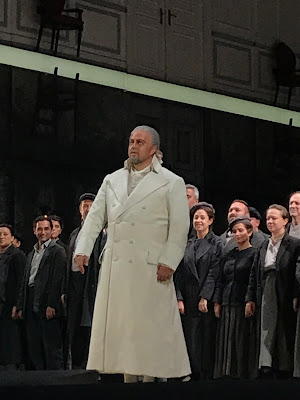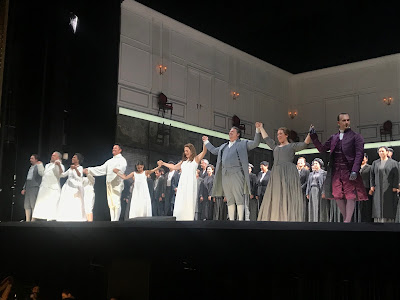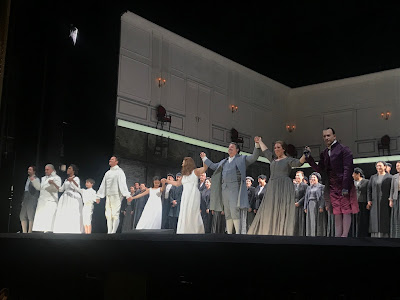(Review in English below)
A opera Medeia de L Cherubini foi pela primeira vez apresentada na Metropolitan Opera, numa encenação de David McVicar.
O espectáculo passa-se num palco com placards em ângulo, que abrem periodicamente deixando ver o que se passa no interior. No fundo há um enorme espelho angulado, que permite um efeito visual interessante. É uma encenação bem conseguida, que também acentua a exclusão da Medeia da comunidade de forma muito eficaz.
Medeia é abandonada por Jasão, de quem tem 2 filhos, que vai casar com Glauce, filha do Rei Creonte. Ameaça Jasão que mata a Glauce se o casamento se concretizar e pede-lhe para voltar para ela, tendo em consideração os filhos. É rejeitada e jura vingar-se. A multidão quer a morte de Medeia e Jasão diz-lhe que abandone Corinto. Ela pede para ficar apenas um dia, para se despedir dos filhos. À criada Neris confessa os seus planos. Dá-lhe para entregar a Glauce, como prenda de casamento, uma túnica e uma tiara envenenadas, que a matarão. Néris tenta dissuadí-la a poupar os filhos mas o desejo de vingança é superior. Tranca-se num templo, mata os filhos e incendeia o templo, lançando-se às chamas.
O maestro Carlo Rizzi dirigiu a Orquestra e Coro que tiveram desempenhos notáveis.
Esta ópera é “one woman show”. O papel de Medeia é longo, exigente e central. A soprano Sondra Radvanovsky teve um desempenho excelente, não só na presença em palco como, sobretudo, na interpretação vocal. Tem uma voz enorme, talvez uma das maiores da actualidade. Esteve sempre bem, com um registo médio brutal, agudos longos e imponentes, e foi muito expressiva e convincente nos diversos sentimentos que a personagem expressa.
Os restantes solistas estiveram também ao mais alto nível. Saliento a criada Néris interpretada por Ekaterina Gubanova que, mais uma vez, foi excelente. Voz afinada sempre sobre a orquestra e com momentos de grande lirismo.
O tenor Matthew Polenzani foi um Giascone correcto, com boa presença e um registo vocal médio sólido mas com algum esforço nos agudos que saíam de menor qualidade.
Outro grande cantor foi o barítono Michele Pertusi como Creonte. Uma boa presença em palco e uma voz forte e bem timbrada.
A soprano Janai Brugger cumpriu como Glauce, apesar de ter uma intervenção relativamente pequena.
No final até houve chuva de papelinhos!! (ou não estivéssemos nos EUA...).
****
MEDEA, METROPOLITAN OPERA, New York, October 2022
L Cherubini's opera Medea was first performed at the Metropolitan Opera, staged by David McVicar.
The action takes place on a stage with angled billboards, which periodically open to reveal what is going on inside. In the background there is a huge angled mirror, which allows for an interesting visual effect. It's a well-crafted staging that also accentuates Medea's exclusion from the community very effectively.
Medea is abandoned by Jason, with whom she has 2 children, who is going to marry Glauce, daughter of King Creon. Medea threatens Jasen saying that she will kill Glauce if the marriage takes place and asks him to return to her, considering their 2 children. She is rejected and swears revenge. The crowd asks for Medea's death and Jason asks her to leave Corinth. Medea asks to stay just one more day, to say goodbye to her children. To her maid Neris she confesses her plans. She asks her to give Glauce, as a wedding gift, a poisoned tunic and loom, which will kill her. Neris tries to dissuade her from killing her children, but her desire for revenge is superior. She locks herself in a temple, kills her children, sets the temple on fire and throws herself into the flames.
Conductor Carlo Rizzi directed the Orchestra and Choir that had remarkable performances.
This opera is “one woman show”. Medea's role is long, demanding and central to the entire opera. Soprano Sondra Radvanovsky had an excellent performance, not only in her stage presence but, above all, in her vocal performance. She has a huge voice, perhaps one of the greatest today, and she was very convincing. She was always well, with a fabulous midrange, long and imposing highs, having been very expressive in the various feelings that the character expresses.
The other soloists were also at the highest level. I would like to highlight the servant Neris played by Ekaterina Gubanova who, once again, was excellent. Voice always tuned over the orchestra and with moments of great lyricism.
Tenor Matthew Polenzani was a correct Giascone, with good presence and a solid mid-vocal register, but occasionally showing some effort in the highs that came out of lesser quality.
Another great singer was baritone Michele Pertusi as Creon. A good presence on stage and a powerful and well-toned voice.
Soprano Janai Brugger performed as Glauce, despite having a relatively small intervention.
****

























































